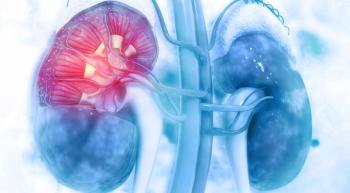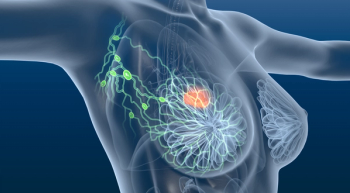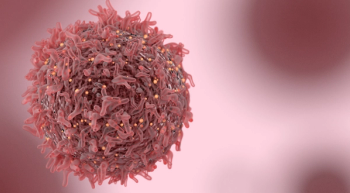
Daratumumab plus lenalidomide and dexamethasone bested standard therapy in producing rapid, deep, and durable responses across subgroups of patients with newly diagnosed multiple myeloma.

Daratumumab plus lenalidomide and dexamethasone bested standard therapy in producing rapid, deep, and durable responses across subgroups of patients with newly diagnosed multiple myeloma.

Phase 3 findings showed that panitumumab plus mFOLFOX significantly improved overall survival in patients with RAS wild-type metastatic colorectal cancer.

Regardless of other identified driver genomic alterations, patients with heavily pretreated, advanced, non–small cell lung cancer achieved encouraging responses with patritumab deruxtecan.

Patients with recurrent C difficile infection receiving SER-109 experienced reduced rates of infection as early as 4 weeks following treatment.

Although the CDC has put forth a strong effort to improve its opioid guidelines, many providers still feel that more can be done.

Approval of off-the-shelf CAR T-Cell therapy options would provide greater accessibility and benefit to patients, say experts.

A real-world analysis showed that the proportion of women with ovarian cancer who required dose modifications or treatment discontinuations while receiving PARP inhibitors differed significantly between olaparib, niraparib, and rucaparib.

Ilene Galinsky, BSN, MSN, ANP-C, senior leukemia protocol research nurse practitioner at Dana-Farber Cancer Institute, underscores key prescribing considerations with venetoclax.

Patients with hormone receptor¬–positive, HER2-negative, node-positive high-risk early breast cancer who have certain characteristics may benefit from early dose adjustments with adjuvant abemaciclib.

Ken Kato, MD, PhD, a medical oncologist at the National Cancer Center of Tokyo, and investigator in the pivotal CheckMate 648 study, underscores relevant safety data updates from the trial and important symptom management considerations with the FDA-approved combinations.

Frontline nivolumab and ipilimumab combination therapy was associated with increased 5-year survivorship in patients with metastatic non–small cell lung cancer—regardless of PD-L1 expression.

Ovarian clear cell carcinoma is a rare histological type of epithelial ovarian cancer that is typically resistant to chemotherapy and is historically associated with poor prognosis for patients.

Elderly patients receiving novel-androgen hormonal therapies, such as abiraterone and enzalutamide, listed forgetfulness as their No. 1 reason for not taking prescribed pills.

Relatlimab, a human LAG-3 blocking antibody, plus nivolumab, elicited superior progression-free survival in patients with advanced melanoma compared to nivolumab alone.

Investigators reported an objective response rate of 43% and a disease control rate of 80% among patients with previously treated KRAS G12C–mutated non–small cell lung cancer who received the KRAS G12C inhibitor adagrasib.

Frontline treatment with lenvatinib plus pembrolizumab decreased risk of disease progression or death by 50% compared with sunitinib in advanced renal cell carcinoma.

At data cutoff, all treated patients in a phase 2 trial experienced a clinical complete response with single-agent dostarlimab-gxly.

Patients with multiple myeloma who received initial combination therapy with lenalidomide, bortezomib, and dexamethasone, plus autologous stem cell transplant, followed by lenalidomide maintenance, experienced improved progression-free survival.

Patients with early-stage breast cancer who have low vitamin D counts may be at risk of developing chemotherapy-induced peripheral neuropathy.

Reducing ribociclib dosing by 200 mg or 400 mg did not affect overall survival in patients with hormone receptor–positive, HER2-negative, advanced breast cancer.

Findings from DESTINY-Breast04 (NCT03734029) support the use of trastuzumab deruxtecan in patients with hormone receptor–positive, HER2-low metastatic breast cancer.

Panitumumab with mFOLFOX demonstrated a clinical benefit for patients with left-sided RAS wild-type metastatic colorectal cancer in the PARADIGM trial (NCT02394795).

Updated safety findings from DESTINY-Breast03 showed that treatment with trastuzumab deruxtecan was safe and tolerable for patients with HER2-positive metastatic breast cancer.

Sacituzumab govitecan elicited a statistically significant and clinically meaningful benefit among patients with hormone receptor–positive, HER2-negative metastatic breast cancer.

Patients with KRAS wild-type pancreatic cancer elicited a significant survival benefit with the addition of nimotuzumab to gemcitabine vs placebo plus gemcitabine in a phase 3 trial.

Avasopasem was associated with a significant reduction in severe oral mucositis in patients with locally nonmetastatic head and neck cancer undergoing chemoradiotherapy.

Although 83% of Black patients with metastatic breast cancer expressed interest in clinical trials, only 40% reported having a conversation about enrollment with their health care provider, highlighting one of many potential barriers to achieving clinical trial diversity.

Kellie Zeichner, RN, BSN, OCN, discusses the production of biosimilars, their approval and naming processes, and why immunogenicity is important when discussing these agents.

Updates to the NCCN guidelines for patients with resectable early-stage NSCLC now include neoadjuvant and adjuvant regimens with chemotherapy, immunotherapy, and targeted therapies, which promise to change biomarker testing practice.

Lisa Vigil Schattinger, MSN, RN, discusses her experience with medical aid in dying, and what oncology nurses need to understand when supporting patients at the end of their lives.